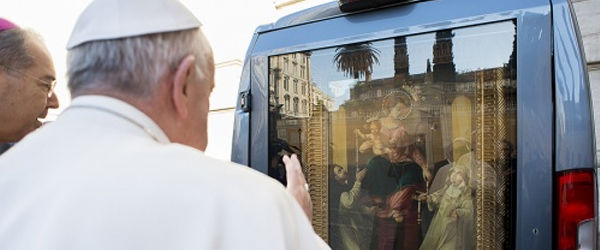Taking a spiritually transformative approach to conflict resolution was the focus of a recent “Summer with the Benedicts” continuing education course for clergy, religious and laity at the Immaculate Heart Retreat House in Los Angeles Aug. 1-5.“We don’t learn conflict resolution skills or relationship skills to win a fight, to avoid litigation or to influence people; we learn these techniques because of our [Christian] identity,” said Msgr. Charles Chaffman, director of the International Institute of Theological and Tribunal Studies sponsoring the “Benedicts” seminars.Course leader Greg Stone, author of “Taming the Wolf: Resolving the Conflicts Ruining Your Life,” outlined techniques for addressing conflict and bringing increased peace to communities. His book combining contemporary conflict resolution approaches with the legend of St. Francis of Assisi’s taming the fierce wolf of Gubbio was the text students used for “The Ministry of Conflict Resolution” seminar.Stone, who earned a master’s in dispute resolution from the Straus Institute at the Pepperdine University Law School, brought in guest speaker and Straus faculty member, Rev. Brian Cox, on Aug. 4 to discuss his faith-based reconciliation ministry work involving international interreligious conflicts. “Faith-based diplomacy really is an emerging paradigm since religion has emerged as a major force in international and national politics,” said Cox, a Santa Barbara-based Episcopal pastor and senior vice president of the International Center for Religion and Diplomacy in Washington, D.C.“The event of Sept. 11, 2001, was sort of like the clarion call that really woke a lot of people up about religion and its role in international politics,” said Cox, who has participated in faith-based diplomacy work in Kashmir and the Middle East.According to Cox, faith-based diplomacy brings together four critical elements: faith, politics, conflict resolution skills and the cross-cultural aspect of conflict. The work of reconciliation, he says, affects politics and political equations. “When you begin to change relationships between communities, you affect politics,” said Cox.He calls faith-based diplomacy a form of “Track II” diplomacy, distinct from “Track I” diplomacy conducted between official state representatives. “It’s often Track II people working on the grass roots level who make a political settlement possible [by] creating a [safe] environment for dialogue and reconciliation between opposing groups,” said Cox.Since 2005, Cox and members from his Christ the King parish have cooperated with the PACIS Middle East Project in Faith-Based Diplomacy, a joint initiative of the International Center for Religion and Diplomacy and the Straus Institute. “There’s a lot of space in the area of Track II diplomacy, particularly in working on creating an environment of peace,” said Cox, who has lately participated in reconciliation work with Palestinian Christians and Muslims.“I think veteran negotiators working in the Middle East know that unless the ‘grass roots’ is prepared for reconciliation, there’s no hope that a political settlement will ever hold at all,” said Cox. “That’s why this work is really so important.”He added that faith-based diplomacy assumes the centrality of reconciliation because it views conflict as a larger socio-political situation that requires healing. “It isn’t just about achieving justice for people,” said Cox. “You have to talk about forgiveness as well.”He notes that faith-based diplomacy is based on eight core values: 1. Pluralism, centered on a pluralistic vision for community members, many of whom who may not presently embrace a pluralistic vision for their group.2. Inclusion, which is difficult if unresolved hostility exists among community members.3. Peacemaking, whereby community members are taught to move from contentious advocacy to constructive problem solving.4. Social Justice, addressing issues of injustice within a community.5. Forgiveness, important for reconciliation.6. Healing wounds, especially historical wounds.7. Sovereignty of God, proclaimed throughout the Bible. 8. Atonement, becoming reconciled.As far as using faith-based reconciliation in multi-cultural parishes common in Southern California, Cox said ministers have to cultivate listening skills and empathy. “You build a relationship, and at the end of the day, you really try to develop a deep sense of caring about the other and that’s what really engenders trust,” said Cox.Achieving reconciliation in parishes, he added, requires persistence. “Teaching and preaching can play a very important role in pastoring a community of people,” said Cox. “As people hear about reconciliation over and over again and all the things related to it, it has an impact on people’s behavior and what they do.”Questioned about how to move into a reconciling role over polarizing issues like immigration, Cox said it requires reframing the conflict. “How do you reframe [immigration] as a discussion of compassion?” he asked rhetorically. “What kind of society do we want to be?“We can disagree whether immigration is an issue of justice (documented vs. undocumented), but at some level all of us have a vested interest in what a compassionate society looks like. Does a compassionate society kick 12 million [undocumented] people out?” Maria Echeverria, vice chancellor of the Diocese of San Bernardino, was impressed with Cox’s message of faith-based reconciliation as a moral vision for transforming people and societies.“It’s been very good to get the insight of why we try to do mediation, why we try to bring reconciliation to the various groups that we work with in our ministries,” said Echeverria.“As much as we are peacemakers, conflict is almost inevitable. So, we need to have the proper tools to work them out so that we can be beacons of hope to people rather than obstacles, that we bring about peace and hope to the people.”Missionary Sister of St. Columban Carmen Maldonado, in adjunct ministry at the archdiocesan Tribunal, said she was inspired by Cox’s personal testimony of faith-based diplomacy.“I applaud the audacity and authenticity with which he puts Jesus Christ as the centerpiece and the compass in faith-based diplomacy,” said Sister Maldonado. “Faith-based diplomacy is about a paradigm shift, but a paradigm shift that leads us back to Gospel.”{gallery width=100 height=100}gallery/2011/0902/benedicts/{/gallery}

